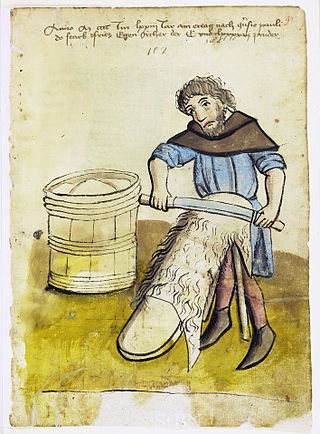Neumann is a German surname, with its origins in the pre-7th-century word neowe meaning "new", with mann, meaning man. The English form of the name is Newman. Von Neumann is a variant of the name, and alternative spellings include Neuman, Naumann(s), Numan, Nauman, Neiman, and Nyeman.
Austen is a surname deriving from the Latin Augustine, and was first used around the 13th century.
Hussey is a surname. The surname is common in the British Isles, as well as locations associated with settlement by the people of these regions. The name has two main sources of origin. The first is of Norman origin, coming from the region of La Houssaye in Northern France. In Old French, the name relates to holly. Hussey also has an Irish origin, stemming from the Ó hEodhasa family.
Slade is a surname of Saxon origin, meaning, variously at different times in different dialects, "a valley, dell, or dingle; an open space between banks or woods; a forest glade; a strip of greensward or of boggy land; the side or slope of a hill." Earliest known references in England as a surname are found in the southwest, especially in Devon.
Pullen is an uncommon English surname with a purported Norman origin.
Moller, Möller, Møller or von Möller is a surname. 'Möller' means 'Miller'. Notable people with the surname include:

Tanner may be a surname of either English, German or Finnish origin. The Anglo-Saxon Tanner was an occupational surname referring to an individual involved in the tannery process. The German form, also spelled Danner, is likely topographic from German Tanne, meaning 'fir tree' and Tann, a place name referring to this. In the Finnish language surname the word tanner is a synonym for 'field' or 'ground'.
Weiss or Weiß, also written Weis or Weisz, pronounced like "vice", is a German and Ashkenazi Jewish surname, meaning 'white' in both German and Yiddish. It comes from Middle High German wîz and Old High German (h)wīz.
Gross or Groß in German is the correct spelling of the surname under German orthographic rules. In Switzerland, the name is spelled Gross. Some Germans and Austrians also use the spelling with "ss" instead of "ß".

The surname "Wagner" is derived from the Germanic surname Waganari, meaning 'wagonmaker' or 'wagon driver.' The surname is German but is also well-established in Scandinavia, the Netherlands, eastern Europe, and elsewhere as well as in all German-speaking countries, and among Ashkenazi Jews.
The surname Eddy is used by descendants of a number of English, Irish and Scottish families.
Gold is a surname. Notable people with the surname include:
Peters is a patronymic surname of Low German, Dutch, and English origin. It can also be an English translation of Gaelic Mac Pheadair or an Americanized form of cognate surnames like Peeters or Pieters.
Hartley is a surname. Notable people with the surname include:
Addison is a Scottish patronymic surname meaning "son of Addie", a Scottish Lowlands nickname for Adam.
Abraham is a surname. It can be of Jewish, English, French, German, Dutch, Irish, Welsh, Cornish, Breton, Lebanese, Syrian and other origins. It is derived from the Hebrew personal name Avraham, borne by the biblical patriarch Abraham, revered by Jews as a founding father of the Jewish people, and by Muslims as founder of all Semitic peoples. The name is explained in Genesis 17:5 as being derived from the Hebrew av hamon goyim "father of a multitude of nations". It was commonly used as a given name among Christians in the Middle Ages, and has always been a popular Jewish given name. The English name Abram is often a short form of Abraham, but it can also be a shortened version of Adburgham, which comes from a place name. As an Irish name, it was adopted as an approximation of the Gaelic name Mac an Bhreitheamhan "son of the judge". The German name Brahm is often a short form of Abraham, but it can also be a topographic name signifying someone who lived near a bramble thicket. The name Braham has been used as an Anglicization of both Abraham and its patronymic Abrahams by Ashkenazi Jews in the British Isles. Abraham has also been used as an Anglicization of the equivalent Arabic surname Ibrāhīm. It is also found as a given name among Christians in India, and has come to be used as a family name among families from Kerala.
Spalding is a surname. Notable people with the surname include:
Wise is a surname. Notable people with the surname include:
Witham is a place in England.
Major and Majors are surnames.
This page is based on this
Wikipedia article Text is available under the
CC BY-SA 4.0 license; additional terms may apply.
Images, videos and audio are available under their respective licenses.

